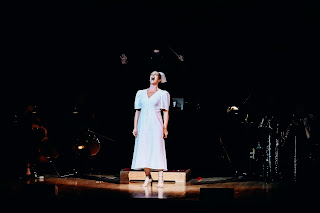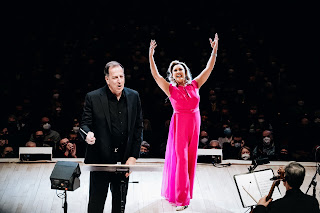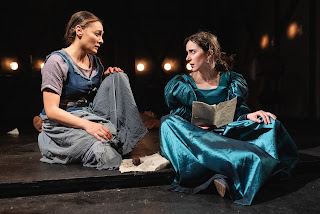The MasterVoices' concert of Anyone Can Whistle was a lovely and poignant reminder that although we have lost Stephen Sondheim, we will always have his work. And, oh!, that work!
 |
| Elizabeth Stanley Photo: Nina Westervelt |
Anyone Can Whistle is, to say the least, a problematic musical, bloated here, thin there, sometimes smart but too often cutesy. But the score includes gems: in particular, "There Won't Be Trumpets," "Anyone Can Whistle," and "With So Little to Be Sure Of." And, like all of Sondheim's work, Anyone Can Whistle rewards multiple hearings and viewings. I have known the original cast recording by heart since the late 1970s, yet I was surprised and delighted over and over again by Sondheim's brilliance, humor, and heart.
The cast of the MasterVoices concert was uneven. Elizabeth Stanley was magnetic, brilliant, moving, thrilling, superb, and fabulous. On the other hand, Vanessa Williams was little better than mediocre; frequently, she seemed uncomfortable with the music, and she lacks the presence necessary to give dimension to the Mayoress. She just wasn't interesting. Santino Fontana is always likeable, and he has a lovely voice, but his performance was bland. While Stanley prepared for and gave a full performance, Williams and Fontana seemed less prepared, and they sang songs rather than playing characters.
One of the highlights of the evening was Joanna Gleason's entrance (she narrated the show). Over 2,800 people greeted her as an old friend, roaring and clapping as she beamed with pleasure. And of course she was wonderful as the narrator.
 |
| Ted Sperling, Vanessa Williams Photo: Nina Westervelt |
Ted Sperling did a nice job as director and an excellent job as conductor. The orchestra sounded terrific. The MasterVoices chorus was entertaining but underused. Weirdly enough, the sound was erratic. Carnegie Hall is famous for its acoustics, and during intermission my friend told me of sitting in the last row of the highest balcony years ago and hearing every unmiked word. I guess the miking was a problem, because the sound was sometimes murky, and occasionally crackly, with much dialogue completely lost.
Before the concert started, Sperling spoke a few words of introduction. He showed us his vocal score, given to him by Victoria Clark in 1984. It was a mistake to put Victoria Clark in our minds, because it was so easy to imagine how amazing she would have been as the Mayoress.
But the evening's two stars made it a concert well worth seeing: Stephen Sondheim and Elizabeth Stanley. They made astonishingly beautiful music together.
Wendy Caster

